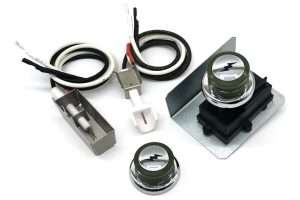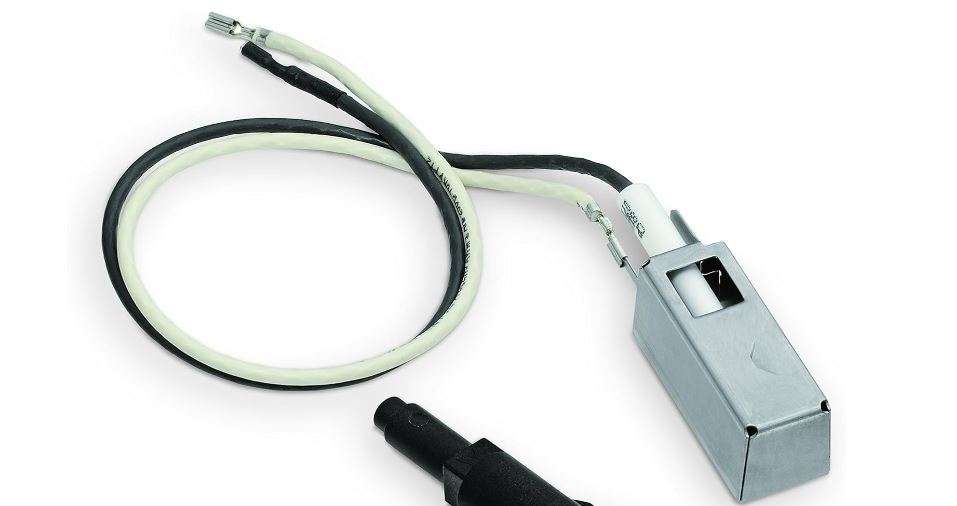When it comes to grilling, the Weber brand stands out as a symbol of quality and innovation. At the heart of every great grilling experience is the Weber grill igniter—an often-overlooked yet crucial component that sparks the journey to mouthwatering meals.
The Significance of the Weber Grill Igniter
The Weber grill igniter plays a crucial role in enhancing the grilling experience and offers several benefits to users. Here are some key advantages of the Weber grill igniter:
- Convenience and Quick Ignition: With just the push of a button or the turn of a switch, users can ignite the grill, eliminating the need for matches, lighters, or other ignition methods.
- Precision Control for Gas Grills: In gas grills, the igniter allows for precise control over the ignition process. Users can easily adjust the heat levels by controlling the number of burners ignited. Furthermore, this precision control enhances the cooking experience, allowing for versatile grilling, from searing at high temperatures to slow cooking at lower heat settings.
- Ease of Use for Charcoal Grills: For Weber charcoal grills equipped with rapid ignition systems, such as the Rapidfire Chimney Starter or the Touch-N-Go gas ignition system, users experience a hassle-free approach to lighting charcoal. Also, these systems eliminate the need for lighter fluid, providing a cleaner and more convenient way to start a charcoal fire.
- Enhanced Safety: The Weber grill igniter contributes to enhanced safety by eliminating the need for potentially hazardous ignition methods, such as matches or lighters. Additionally, users can safely ignite their grills without the risk of burns or accidents associated with alternative ignition techniques.
- Reliability and Consistency: Weber is known for manufacturing high-quality grills and components, including reliable ignition systems. A dependable igniter ensures that users can consistently start their grills with confidence. Notably, consistency in ignition is particularly important for achieving predictable cooking results and maintaining a stress-free grilling experience.
Also read>> Weber Grill Cover – Why You Need One?
When to Replace your Weber Grill Igniter
Knowing when to replace your Weber grill igniter is essential for maintaining optimal grilling performance. Here are some signs and situations that may indicate it’s time to replace the igniter:
- Weak or No Spark: If you notice that the igniter produces a weak spark or no spark at all when attempting to start your grill, it could indicate a faulty igniter. This is a common sign that the ignition system may need replacement.
- Corrosion or Rust: Exposure to the elements, especially in outdoor settings, can lead to corrosion or rust on the ignition components over time. If you observe significant corrosion on the electrode or other parts of the igniter, it may affect its performance and reliability.
- Damaged Wiring: Check the wiring connecting the ignition system components. If you find frayed wires, loose connections, or other visible damage, it’s a signal that the wiring may need replacement to ensure a consistent spark.
- Inconsistent Ignition: Inconsistencies in ignition, such as intermittent sparking or difficulty in starting the grill, may indicate issues with the igniter. If you find yourself struggling to light the grill consistently, it’s worth considering a replacement.
- Age of the Grill: Over time, general wear and tear can affect the performance of the igniter. If your Weber grill is several years old and you experience ignition problems, it might be a good idea to replace the igniter as part of regular maintenance.
- Gas Flow Issues: If you have a gas grill and you’ve confirmed that the gas supply is not the issue, problems with the igniter could be preventing the gas from igniting. In such cases, it’s advisable to inspect and potentially replace the ignition system.
Weber Grill Igniter at Amazon

FAQs
Why does my Weber grill not ignite?
If your Weber grill is not igniting, there could be several reasons for this issue. Here are some common troubleshooting steps to help you identify and address the problem:
- Check Gas Supply: For gas grills, ensure that the propane tank or natural gas supply is connected and has an adequate amount of fuel. A low or empty gas tank can prevent proper ignition.
- Inspect Burner Tubes and Venturi Tubes: Check the burner tubes and venturi tubes for any blockages, debris, or spider webs. Clear any obstructions to ensure proper gas flow.
- Verify Ignition Source: If you have a gas grill, make sure the electronic ignition is working. Listen for the clicking sound or visually inspect for a spark when attempting to ignite. If there is no spark, the ignition system may need attention.
- Replace Batteries: If your grill’s ignition system is battery-powered, replace the batteries with fresh ones. Weak or dead batteries can prevent the ignition system from functioning properly.
- Inspect Ignition Electrode: For gas grills, check the ignition electrode and ensure it is clean and free of any debris. Use a soft brush or cloth to clean the electrode, as dirt or grease buildup can hinder ignition.
- Adjust Electrode Position: Ensure that the ignition electrode is correctly positioned in relation to the burner ports. The electrode should be close enough to create a spark that can ignite the gas.
- Test Manual Ignition (For Gas Grills): If your gas grill has a manual ignition option, try using a long-reach lighter or a grill match to manually light the burners. If the burners light manually, the issue may be with the electronic ignition system.
Why is my grill igniter not clicking?
If your grill igniter is not clicking, there are several potential reasons for this issue. Here are some common causes and troubleshooting steps to help you address the problem:
- Battery Issues: If your grill igniter is battery-powered, the batteries may be weak or dead. Replace the batteries with fresh ones and ensure they are installed correctly, with the positive and negative ends aligned according to the markings.
- Dirty or Wet Ignition Electrode: The ignition electrode may be dirty or wet, hindering the spark. Clean the electrode using a soft brush or cloth to remove any debris, grease, or moisture. Ensure the electrode is dry before attempting to ignite the grill.
- Faulty Ignition Switch or Button: The ignition switch or button may be faulty. Test the switch or button to ensure it is functioning correctly. If it’s not working, it may need to be replaced.
- Moisture or Corrosion: Moisture or corrosion on the ignition components can inhibit the spark. Check for any signs of moisture or corrosion and address the issue by drying the components or cleaning them as needed.
- Gas Flow Issues: If there is insufficient gas flow to the burners, the igniter may not produce a spark. Check for proper gas supply and ensure the control knobs are turned to the correct position to allow gas flow.
- Faulty Ignition Module: The ignition module, responsible for generating the spark, may be faulty. If you’ve ruled out other potential causes, the ignition module may need to be replaced.
- Worn-out Ignition Electrode: Over time, the ignition electrode may wear out. If it shows signs of significant wear, such as a worn or eroded tip, it may be time to replace the electrode.
- Freezing Temperatures
What causes a grill ignitor to fail?
Several factors can cause a grill ignitor to fail. Here are some precise reasons:
- Battery Issues: Weak or dead batteries in battery-powered ignitors can result in a failure to generate a spark.
- Dirty or Wet Electrode: Debris, grease, or moisture on the ignition electrode can hinder the spark, leading to ignition failure.
- Electrode Misalignment: If the ignition electrode is not properly aligned with the burner ports, it may fail to create a spark for ignition.
- Damaged Wiring: Frayed wires, loose connections, or visible damage in the wiring can disrupt the electrical circuit and cause ignition failure.
- Faulty Ignition Switch or Button: A malfunctioning ignition switch or button can prevent the ignitor from initiating the spark.
- Moisture or Corrosion: Moisture or corrosion on the ignition components can inhibit the spark, leading to ignition failure.
- Gas Flow Issues: Insufficient gas flow to the burners can result in the ignitor failing to produce a spark for ignition.
- Faulty Ignition Module: A malfunctioning ignition module, responsible for generating the spark, can cause the ignitor to fail.
- Worn-out Electrode: Over time, the ignition electrode may wear out, particularly if the tip becomes eroded or damaged.
- Freezing Temperatures: Extremely cold weather can affect the vaporization of gas, leading to ignition failure in some cases.
- Aging Components: The overall wear and tear of ignition system components over time can contribute to failure.
- Manufacturer Defects: Rarely, manufacturing defects in the ignitor components can lead to premature failure.
Why does my Weber grill igniter keep clicking?
If your Weber grill igniter keeps clicking, there are several potential reasons for this issue. Here are some precise explanations:
- Moisture or Grease Buildup: Moisture or grease on the ignition electrode or in the ignition module can cause continuous clicking. Clean the electrode and surrounding components to eliminate these issues.
- Faulty Ignition Switch or Button: A malfunctioning ignition switch or button may cause continuous clicking. Check the switch or button for proper functioning and replace it if necessary.
- Stuck Ignition Button: The ignition button may be stuck in the “on” position, causing continuous clicking. Inspect the button and ensure it returns to its normal position after each use.
- Wiring Issues: Damaged or frayed wires in the ignition system can create a continuous circuit, leading to persistent clicking. Inspect the wiring for any visible damage and replace as needed.
- Faulty Ignition Module: A malfunctioning ignition module, responsible for generating sparks, can cause continuous clicking. If the module is defective, it may need to be replaced.
- Misalignment of Ignition Electrode: If the ignition electrode is not correctly aligned with the burner ports, it may continually attempt to spark. Ensure proper alignment to resolve the issue.
- Excessive Gas Flow: High gas pressure or excessive gas flow can cause continuous sparking. Check for proper gas regulation and ensure the control knobs are turned off when not in use.
- Worn-out Ignition Components: Wear and tear on ignition components, such as the electrode or wiring, can lead to continuous clicking. Inspect these components for signs of deterioration and replace if necessary.
Courtney is a professional grilling enthusiast who has spent a good portion of his life grilling and exploring different methods and techniques for preparing delicious meals. As he always says, creativity is key to preparing sumptuous meals.
